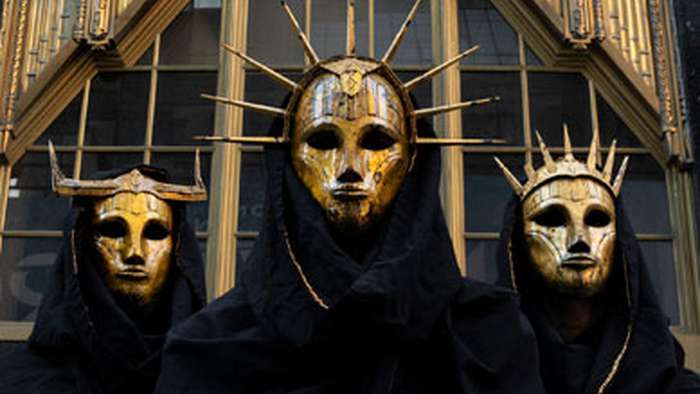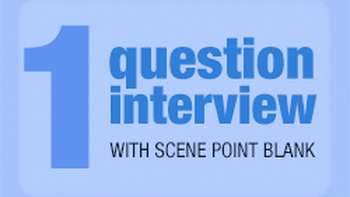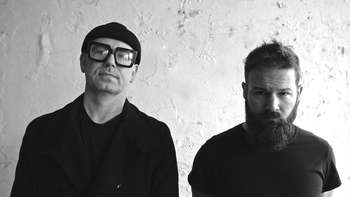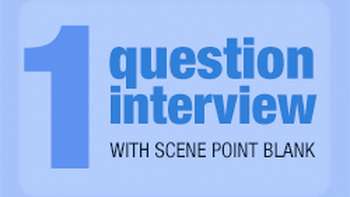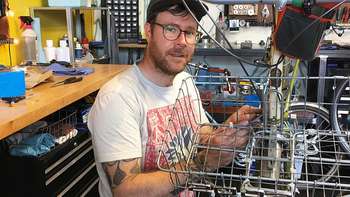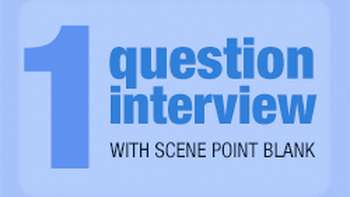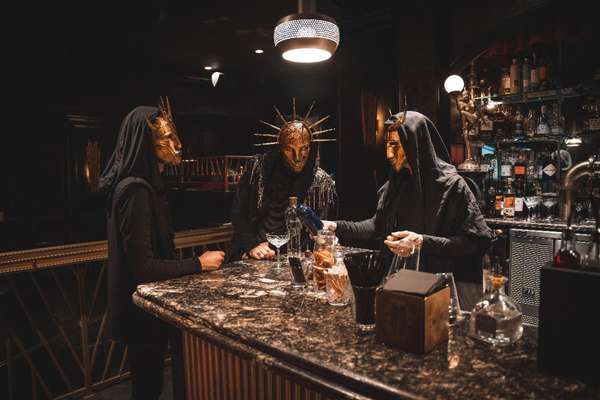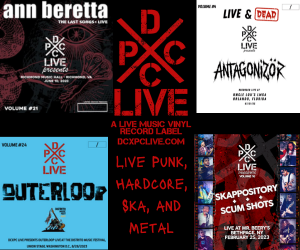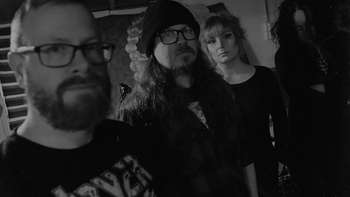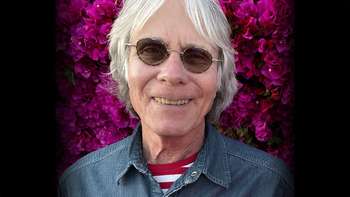
Scene Point Blank: I've also heard that your songwriting involves a fair amount of improvisation. How does the improvisation jell with the more controlled aspects of your process?
Steve Blanco: Improvisation is a very natural part of making music. First time you pick up an instrument and play it, make it make a sound, that's improvisation. If you are really into crafting parts like we are, how you balance that out is you have to create a structure that you then improvise around. We could get super nerdy about this shit, but the balance between crafted and thoughtful parts and improvisation is a taste thing. How much do you want of each? You have to strike that balance.
Scene Point Blank: How do you resolve differences in taste and intention? What does that push and pull look like?
Steve Blanco: It's very rational. We all love music so much and we all really try to keep open minds. All the touring and all the evolving that we've done, the three of us have gotten real tight and no one's afraid to throw an idea out there just because someone else might not be into it. There may be disagreements when constructing something, but how we handle it is that we just take that part out or we put it somewhere else. It may show up in another verse or even another album. As crazy as it sounds, we generally see eye to eye on most things. That's why things seem to be evolving and working. In general we're all "go fuck off" kind of guys, but between the three of us we're trying to build something, and we're trying to build it together.
Scene Point Blank: You're rational in the expectation that if you give in one respect you're going to get in another.
Steve Blanco: You have to compromise in the creative world. Even someone who an audience would see as uncompromising, like say Stanley Kubrick, of course had to deal with obstacles in his creative process that required compromise. And obviously, you have to be lucky enough to be able to work with like-mined people.
Scene Point Blank: Right you guys are all pretty talented, pretty connected, you have a good thing going. And you're all well-networked too. It seems like when you need to find someone outside of the band to do something that you can't, you're connected enough that it makes it easy to find the right person.
Steve Blanco: There is such a massive pool of talent out there. It's pretty incredible.
Scene Point Blank: Who were you most excited to play with on this record?
Steve Blanco: It was bad ass to play taiko drums with Tomas [Haake] from Meshuggah. That connection came through Kenny. We played and recorded in a Japanese dojo in Brooklyn. The owner of the dojo, Hero, builds drums and travels all over the world teaching people how to play them. The space is not set up as a studio, that we did that ourselves. That was such a cool experience. But everyone on the album was awesome to work with. We have these crazy vocals in there from Yoshiko [Ohara] and Sarai [Chrzanowski], and of course those were used in a lot of different ways. Working with Trey was great as well, so was Colin Marston, who is almost a member of the band at this point.
Scene Point Blank: That's really great that you've been able to work with a member of Mr. Bungle. That's another band who likes to play around in both metal and jazz spheres. Makes me curious when you guys are going to cut a record with John Zorn.
Steve Blanco: Haha, there is nothing in the works right now. But who knows. Kenny already works with John. He's been on a couple of his projects, including Simulacrum. I don't know him personally, and I don't know what he thinks of our work, but it would be cool.
"You have to play your instrument at a certain level of proficiency to be able to express what you hear in your head [for metal and jazz]"
Scene Point Blank: What are some of the connections between playing metal and playing jazz that people may not realize are compatible?
Steve Blanco: There is one insanely clear connection, and it’s that you have to play your instrument at a certain level of proficiency to be able to express what you hear in your head. You don't have to go to a conservatory, but you do have to be good enough to make what you have in your head come out of your instrument. I never thought of music as too genre specific. It's always been whether I like it or not. Whether it's good or it's not. That of course is subjective. Recently though, jazz musicians have been looking to metal as a source of inspiration, and vice versa. I know a lot of great players in New York, guys who I came up with who are Meshuggah fans. There are so many connections and it's really very dynamic. People ask us what records inspire us, and one is this record Money Jungle from Duke Ellington, Max Roach, and Charles Mingus. That's inspiring for us, the way that they play together as a trio. And when you listen to it, it's fucking heavy, they are playing the shit out of their instruments.
Scene Point Blank: Yeah, Money Jungle is a fantastic album! It's so alive, it feels like a lot of the tracks on that album have their own heartbeat.
Steve Blanco: A band should have a heartbeat. They should be feeling what they're playing. And if the band is feeling it, then the audience will be feeling it too.
Scene Point Blank: It's something that I really love about heavy metal is that you can really tell when a band is into what they're doing. You can feel it and it just feels awesome!
Steve Blanco: Dude, yeah for sure.
Scene Point Blank: Let's pivot a little and talk about your record, Alphaville, out July 31, on Century Media. First thing's first, where does the name come from?
Steve Blanco: The name comes from a movie from a French new wave filmmaker, John-Luc Godard. It was the inspiration directly for the album title, a song on the album, and the themes of the album as a whole. The film paints a picture of totalitarian control and artificial intelligence. There are no sets or special effects. It's all just filmed on the streets of Paris. It's a very interesting piece of art that I highly recommend. Alphaville means "#1 City," and we write about New York and we consider it our "#1 City" both good and bad.
Scene Point Blank: New York is kind of a world capital city, isn't it? All of the world's commerce moves through there.
Steve Blanco: Yeah, could change, but it is right now for sure. It's a fucked up place. You been there?
Scene Point Blank: Yes, a few times.
Steve Blanco: Yeah, then you catch the vibe. It's a tough place to live. It's also the apex of evil. All of the evil forces in the world are doing business there. You think of fictional portrayals of bankers and crime lords counting money in high rises. Those portrayals are fictional but they're inspired by real people.
"You think of fictional portrayals of [New York] bankers and crime lords counting money in high rises. Those portrayals are fictional but they're inspired by real people."
Scene Point Blank: Right, the details of the portrayals don't matter, it’s the truth that the fiction points to that matters.
Steve Blanco: Exactly. And all the stuff that we talk about is connected thematically. We try to look at the bigger picture of civilization. Like, how was it engineered and construed, how was it carnally engineered and where is it going? We ask these questions and then try to zoom in and ask: how do people feel about it, how do people react, what's the struggle, where is the divide between the bottom and the top? Looking at ancient history, the best we can (none of us were actually there), but looking at it the best we can, you can get an idea of how things have been moved along and how they get moved along, what the designs are that we're not aware of. We try not to add too much of our own opinion, though, because the truth is that we really have no idea.
Scene Point Blank: A lot of the mechanisms of power operate openly and people still can't see them. It's one of the amazing aspects of power in my opinion.
Steve Blanco: Yeah, it's hidden in plain sight. But it's still invisible to most people and there are different information circles at different levels of society that we're not all privy to. There are so many barriers at so many levels that keep you from really seeing the whole picture even when it's right in front of you.
Scene Point Blank: Right, not all of us are invited to the Bohemian Grove.
Steve Blanco: Haha, exactly.
Scene Point Blank: I like that Imperial Triumphant has adopted an art deco aesthetic. So many metal bands adopt a satanic or occult image for themselves, and I like that yours is a little more clean and elegant. But I wonder if you think that there is still some connection between the art deco movement and the occult.
Steve Blanco: It seems fairly obvious that there is some kind of a connection. Although, I can only speak for myself when I say that there is most definitely a connection. If you look at the movement, it's very impressive, even today the top of the Chrysler Building still looks insane: stainless steel with a bunch of pyramids, it's a very powerful structure. And then if you look back to Egyptian structures and ancient Persian structures you see a lot of the same elements. Those who built the Chrysler Building probably did so as a monument to some esoteric thing that I am not privy. They captured something there, some expression of power, and we are doing the same in writing about New York, in attempting to capture the sounds and moods of the city. We're not just looking to money and economics though. There are many elements, spiritual things and artistic movements we are speaking to as well. All of these things transpire probably because of the energy that surrounds them at different times. We're trying to channel all that.
Scene Point Blank: I really like that you are taking such a deep look at the power dynamics of society and trying to tap into some older forms of humanity with your work. That's extremely cool. Fast-forwarding back to the present though, what are some of Imperial Triumphant's plans for the future? What do you hope happen in the next 6 months?
Steve Blanco: We'll we're definitely looking forward to a good reception to the album and a solid launch on July 31st. That's very important to us because we put a lot of work into it. So far the reception has been good. Other than that we have another video in the works. We're looking to shoot that in August. We had to postpone the shoot because it was scheduled for right around the time that everything shut down. Instead we created a bunch of animated videos which have turned out to be cool, especially the "Rotted Futures" video which was done by my friend Louise F. Cuffari. We're putting together a tour schedule for 2021 as well. We're working on some ideas for a new album. We're also looking into something that may turn out to be a movie. However we can stay creative, that's what we're going to be doing the next few months.
Ideally, what I think we'd all like to see, is that we can move past these obstacles and global obstructions so that we can play live again.
--
Alphaville is out now via Century Media. You can preorder from here.
